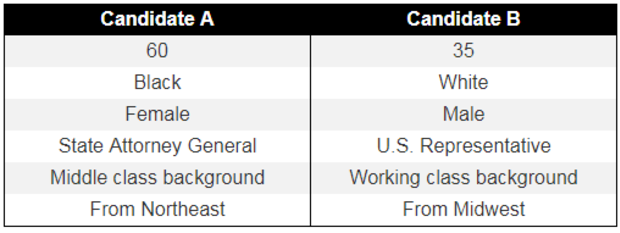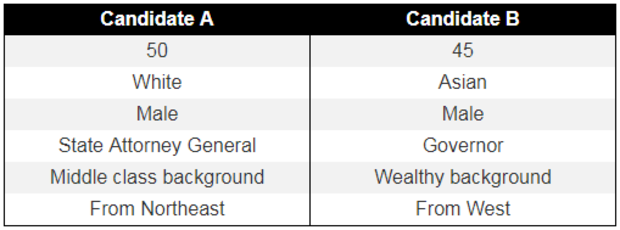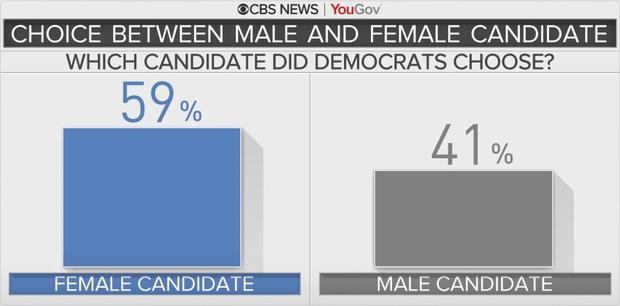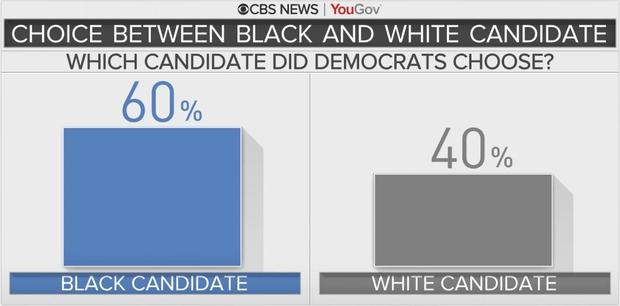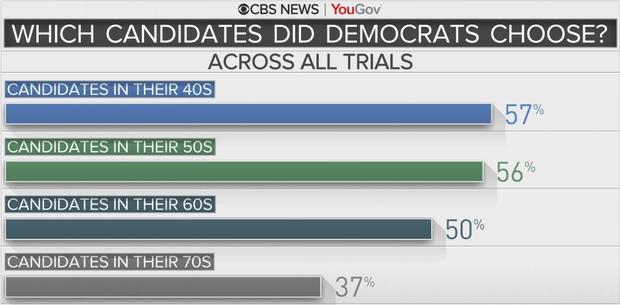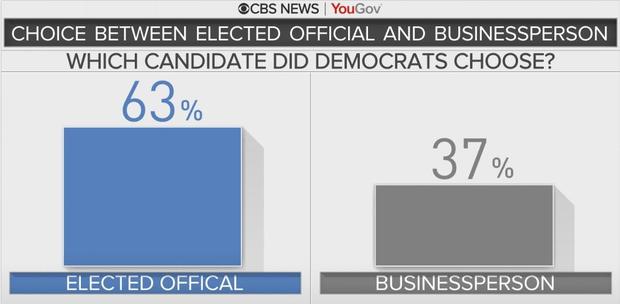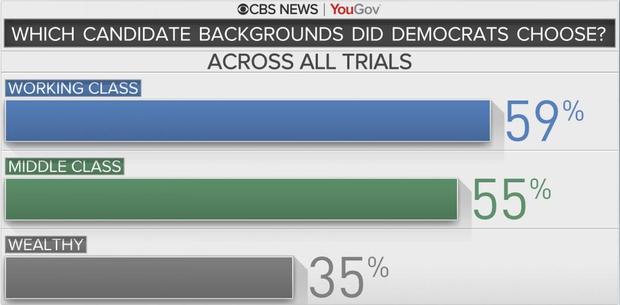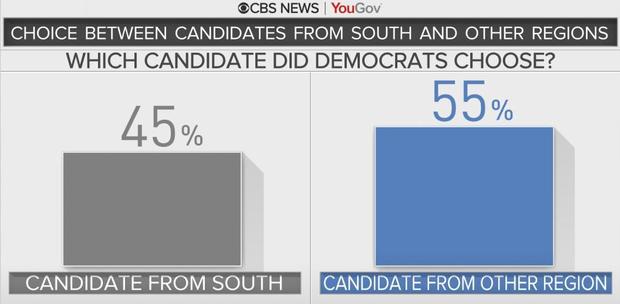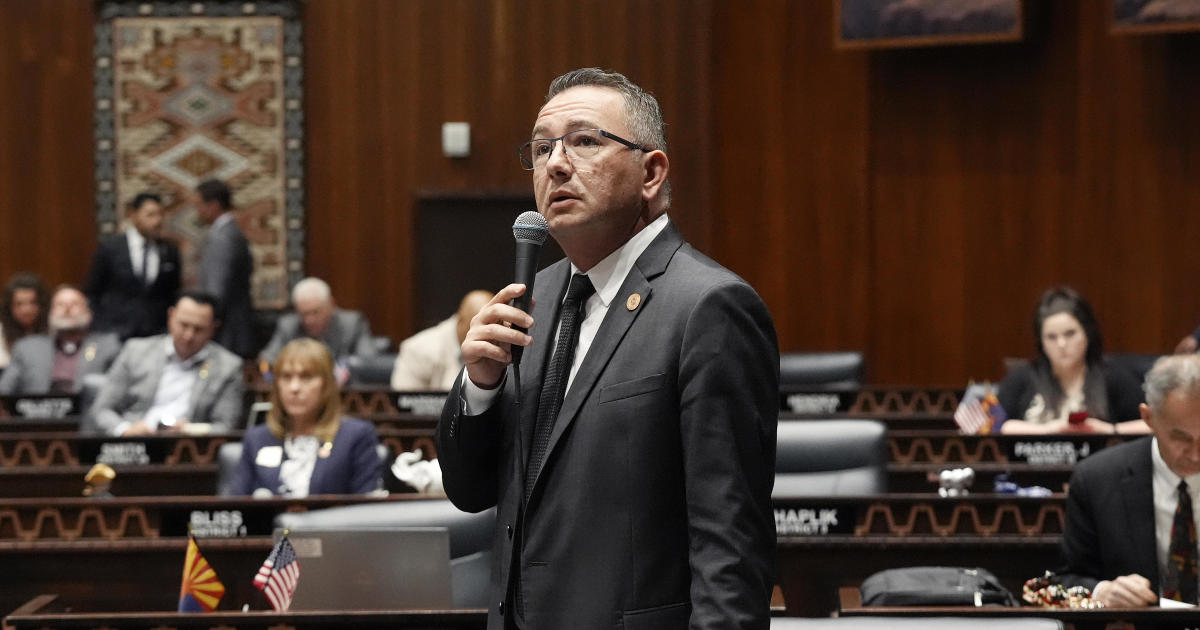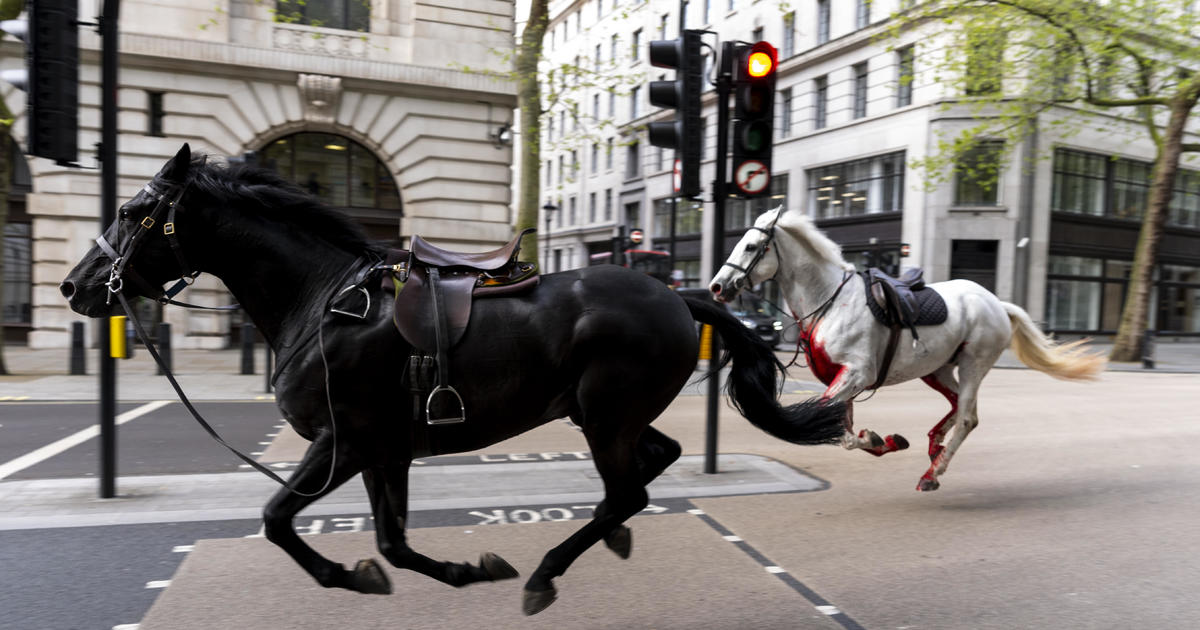What traits are Democrats prioritizing in 2020 candidates?
With a historically diverse Democratic field of presidential candidates, we looked at what traits voters are prioritizing in 2020. Do they want a woman? Would they prefer voting for someone white or a person of color? Would they like someone young or old? These issues can be hard to talk about and even harder to poll. People sometimes say they want one thing but choose differently. To figure out what candidate qualities actually matter to voters, we looked at what they do, not only what they say.
In partnership with YouGov, we gave voters a series of match ups between hypothetical candidates for the Democratic nomination in 2020. We randomly varied several traits for each candidate: their age, race, gender, job title, social class, and home region. None of the profiles were meant to imply any real candidate in the race. We labeled them as "Candidate A" and "Candidate B" rather than use any names. In one example, Candidate A might have been a 60-year-old, black, female state attorney general, and Candidate B might have been 35-year-old, white, male U.S. representative. Voters were simply asked to choose one of the two candidates. Here's how the first match up might have looked on the screen…
We then gave voters another match up and asked them to do the same. It might have looked like this…
We gave each voter several match ups, randomizing traits each time. We collected thousands of decisions about all sorts of match ups. Again, all match ups were hypothetical, and no actual names were used. In the end, the analysis combines all choices made by voters and offers a look at what traits stood out in their selections. This technique, known as conjoint analysis, is used often in marketing and political science. (See technical details here.)
We looked at choices among voters who identify as Democrats, as well as independents who lean toward the Democratic Party, many of whom will cast ballots in a 2020 Democratic presidential primary or caucus. Here are the traits that emerged as important to these voters.
What traits are democratic voters prioritizing in 2020 candidates? Instead of just asking them, we looked at what types of candidates they *choose* in a series of hypothetical match ups. Excited to share new @CBSNews/@YouGov data on this topic, featuring conjoint analysis! (1/12)
— Kabir Khanna (@kabir_here) May 2, 2019
Gender
Voters showed a clear preference for females, all else equal. When given one male and one female, voters selected the female 59 percent of the time. Men and women both preferred female candidates, but women were especially likely to pick females over males – by over 20 percentage points.
Race
Voters picked people of color more frequently than whites, by 57 percent to 43 percent. Voters had a slight preference for Latino candidates and a strong preference for black candidates. When match ups include a white and a black candidate, for example, voters chose the black candidate 60 percent of the time.
There were some differences by voter race. Black voters chose black candidates over two-thirds of the time, and Latino voters had a stronger preference for Latino candidates. However, even white voters chose candidates of color more often than white candidates.
Age
Overall, voters strongly preferred younger and middle-aged candidates to candidates in their 70s. To analyze age, we looked across all match ups to see how often certain ages were selected, regardless of who the opponent was. In this analysis, if a trait is selected more than half the time, it means that the trait increases the odds of selection.
Voters chose people in their 40s about 57 percent of the time and people in their 50s about 56 percent of the time, indicating that these age ranges are desirable, on average. People in their 60s were chosen roughly half the time. People in their 70s, on the other hand, were only picked 37 percent of the time. In these hypothetical match ups at least, there is little appetite among voters for septuagenarians. This effect was among the strongest we found. There are few differences by voters' own age – even older voters preferred younger candidates.
Job Title
Going beyond demographic traits, we also tested various job titles, including elected offices at the federal and state level, as well as people in the private sector. (Elected officials included Senators, U.S. Representatives, governors, mayors, and state attorney generals.) Voters had a strong preference for elected officials, choosing them in match ups with a businessperson 63 percent of the time.
CBS News Poll Analysis: Majority of Democrats want a candidate who will unite the country
Social Class
We tested three backgrounds with respect to social class: working class, middle class, and wealthy backgrounds. Voters of all education and income levels preferred working class and middle class background to wealthy ones. Looking across all match ups, working class was chosen 59 percent of the time, middle class 55 percent of the time, and wealthy only 35 percent of the time.
Region
There were not huge differences by the candidate's home region. Voters did not differentiate much between people from the Northeast, Midwest, and West. However, voters were less likely to choose people from the South when they were pitted against people from other regions (45 percent vs. 55 percent).
Self-identified liberals and voters who told us they were very likely to vote in a 2020 primary or caucus were especially likely to pick women and people of color. They also had a stronger distaste for businesspeople and people from wealthy backgrounds, indicating that such candidates may face a hurdle when trying to court the party's base in the primary.
While these results illuminate what traits matter to Democratic leaning voters in the abstract, an important caveat is in order. As opposed to these hypothetical profiles, real presidential candidates are more than a bundle of six traits. The have distinct policy positions, histories, and personalities. Their baggage, good and bad, will likely also matter to voters. That said, this analysis reveals a latent appetite among the Democratic rank-and-file for certain types of qualities in 2020.
This CBS News survey was conducted by YouGov using a nationally representative sample of 2,210 U.S. registered voters interviewed online between April 22-26, 2019. This sample was weighted according to gender, age, race, and education, based on the American Community Survey, conducted by the U.S. Bureau of the Census, as well as 2016 Presidential vote and registration status. Respondents were selected from YouGov's opt-in panel to be representative of all U.S. registered voters. Candidate traits were randomized independently of one another. Trait order was randomized across respondents and fixed within respondents.
